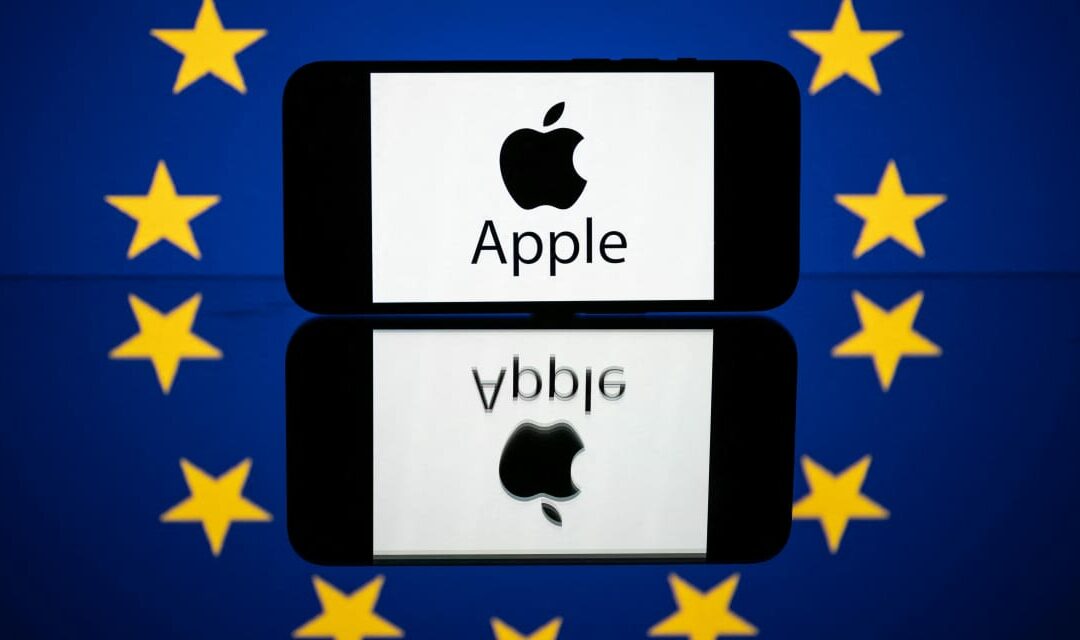As Apple Inc. absorbs the regulatory body blow of a record $1.95 billion antitrust fine from the European Union on Monday, its legal team is bracing for yet another epochal action.
The U.S. Department of Justice is in the final stages of a yearslong investigation into Apple
AAPL,
which could lead to a lawsuit as soon as this month.
The probe — which reportedly focuses on everything from the seamless integration between the iPhone and Apple Watch, to the company’s digital-payments system and its use of green text bubbles to differentiate Android text messages from iMessage communications — is nothing short of an all-out assault on Apple’s $2.8 trillion “walled garden” to its core.
Read more: Department of Justice edges toward antitrust case vs. Apple: report
The immediacy of the Justice Department lawsuit on the heels of the EU fine underscores an escalating crackdown on Big Tech by government agencies, after numerous attempts to legislate the tech industry have floundered. Justice officials aren’t just preparing a case against Apple — they are charging ahead on blockbuster lawsuit against Alphabet Inc.’s
GOOGL,
GOOG,
Google advertising business that will go to trial in early September. (The advertising case is the second major recent antitrust action targeting Google: A trial last fall challenged Google’s dominant role as the default search engine on millions of devices.)
At the same time, the Federal Trade Commission and 17 state attorneys general in September sued Amazon.com Inc.
AMZN,
alleging the company is a “monopolist that uses a set of interlocking anticompetitive and unfair strategies to illegally maintain its monopoly power.”
To complicate matters even further, tech companies must comply with the EU’s Digital Markets Act, which makes large players in ad tech accountable for user data they collect and use in the European Union. The DMA goes into effect March 6.
“The decision from the EU today is just the latest example of their blatant targeting of American tech firms,” James Czerniawski, tech-policy expert at Americans for Prosperity, said in an interview.
“The biggest risk that comes with the increased scrutiny by U.S. antitrust enforcers is that it’s increasingly bleeding over into other sectors of the American economy,” Czerniawski added. “Whether it is the collapse of the JetBlue
JBLU,
[and] Spirit Airlines
SAVE,
merger, the abandonment of the Nvidia
NVDA,
and Arm
ARM,
merger, or the recently challenged Albertsons
ACI,
[and] Kroger
KR,
merger, these developments threaten the country’s long-term economic prospects and are deeply concerning.”
The EU’s massive fine against Apple, for abusing its position in the market for the distribution of music-streaming apps, is its first against the iPhone maker and one of its largest ever levied on a tech company. The news sent Apple shares down 3%.
Music-streaming rival Spotify Technology
SPOT,
which filed a complaint against Apple in 2019 leading to the investigation, said the fine “marks an important moment in the fight for a more open internet for consumers.”
Apple countered that Spotify would benefit greatly from the decision. “Today, Spotify has a 56% share of Europe’s music-streaming market — more than double their closest competitor’s — and pays Apple nothing for the services that have helped make them one of the most recognizable brands in the world,” Apple said in a statement. It added that a “large part” of Spotify’s success is because of Apple’s App Store.
Apple has largely avoided antitrust actions, and was successful in one recent notable suit. When videogame developer Epic Games Inc. attempted to change Apple’s App Store policies, it lost 9 of 10 counts in a 2021 decision. Its only win was a judgment to suspend a rule about being able to email app customers, and that ruling is currently being appealed to the U.S. Supreme Court.









